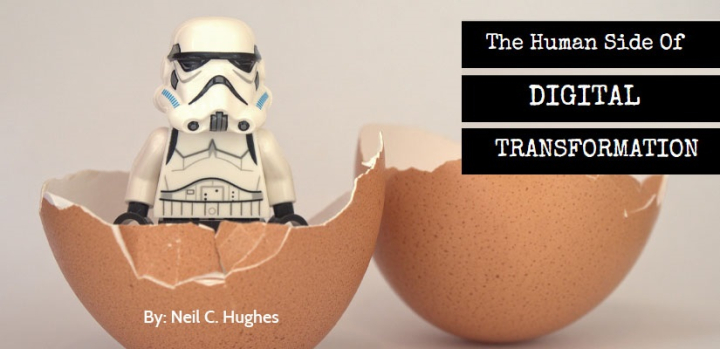We are approaching the 24th anniversary of Bill Gates and Steve Ballmer dad-dancing their way through the Windows 95 launch to Start Me Up by The Rolling Stones.
How we communicate, work, share information, and collaborate has dramatically changed since then...pencil, paper, typewriters, and desk calculators quickly got replaced by PCs, Microsoft Office and more recently by mobile devices.
Technology rendered many jobs from the nineties obsolete, but it also paved the way for new disciplines such as web development, data science, cyber security, search engine optimisation and social media.
Here in 2019, we are once again preparing for a technological shift that will change the employment landscape in a similar way.
The next digital transformation is looming, in the shape of Artificial Intelligence, Machine / Deep Learning and Natural Language Processing.
But what does all this really mean? And how will it affect your most valuable asset, your employees?

Businesses across multiple industries are focussing fervently on digital transformation efforts to remain relevant in an experience economy - large-scale IT projects and cutting-edge technology implementations continue apace. Such projects often promise to remove data silos and unite departments.
The distraction caused by the shiny allure of technology also delivers an illusion that a magic box will transform processes and help the company reach its new business goals. While transfixed by the possibilities and opportunities ahead, are we unwittingly neglecting the essential human component needed to make it a success? The result, according to McKinsey, is that 70 percent of transformation efforts fall short of their stated goals.
Those that dare to look beyond the digital transformation buzzword will quickly learn that it's often driven by the demands of their customers and clients to make it easier to do business. The whole point of "digitalisation" of products or services is ultimately to create human value, increase collaboration, and enhance experiences. This, in turn, should increase revenues.
Problems often arise when everyone becomes distracted by the smoke and mirrors of the latest technology solution. Change might be the only constant in life, but this does not stop words such as automation sending shockwaves through a company and prevent buy-in from those required to make it work. The all too often overlooked ingredient to success is the human factor.
At the heart of every process, customer experience, and digital transformation is quite simply people that are connected by information. The lines between Business-to-Business and Business-to-Customer are beginning to blur in a digital age where Human-to-Human is the new currency. Actual human relationships between workers, users, and consumers that are connected by technology is the vision that many are struggling to see.

Technology is the connector, yet engaging meaningfully with your employees and building a culture of collaboration and emotional intelligence is critical to the success of every project. Employees need to feel integrated and a sense of belonging to every element of the digital transformation process. Regardless of the technology or project plan, the absence of a unified approach will create more problems than you set out to solve.
Contrary to popular opinion, finding a vendor who can implement a system that will help you reach your digital transformation goals is the easy part. Preparing your entire organisation to adapt to new ways of working and overcoming the cultural changes that a technological shift creates is by far the biggest challenge.
One of the biggest mistakes that many firms make is the implementation of the latest technology solution to replace humans and reduce costs. That's not how it works. Leveraging technology to deliver increased revenues and experiences that make a company stand out from the crowd involves people working alongside technology, rather than being replaced by it.
The digital transformation of everything should be about empowering employees by freeing them from the shackles of mundane and repetitive tasks. We are moving towards a hybrid workforce where staff can learn new skills, improve performance, deliver higher value and be involved with much more exciting work that makes them want to jump out of bed in the morning.

Failing to engage with staff and neglecting to take them with you on your digital transformation journey will deliver poor morale across your entire workforce. A slow rate of adoption and the delivery of the exact opposite of what you set out to achieve usually follows. Employees will need help in overcoming their fears and be motivated toforming new habits to help them adapt to change.
Changing the mindset embedded in the culture of a company should be taking centre stage.Building a new future of the organisation as a united team should then drive the technology, rather than the other way around. Digital transformation is the buzzword that every business is talking about, but it's critical to remember that it's a journey, not a destination.
Anyone who remembers the Windows 95 launch or Microsoft's Steve Ballmer's passionate speech about how developers will change the world will know that we have been here before. We have already witnessed the impact that technology evolution has on employees and how roles eventually disappeared.

Businesses need to be investing more time on human adaptation and ensure everyone is ready for a new way of thinking and working. The main focus should be on mentoring, training and transitioning employees, as well as implementing new technologies. If you look after the people within your organisation, the technical aspects will take care of itself.







